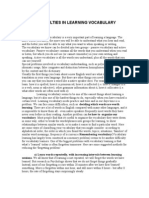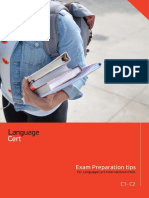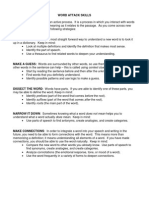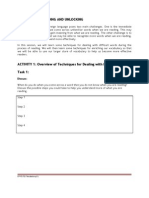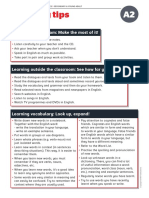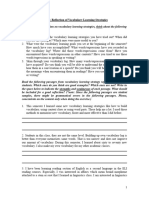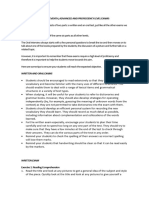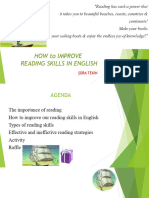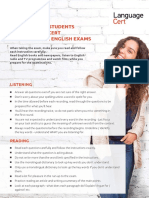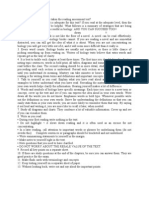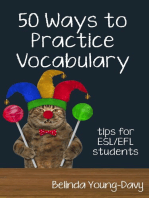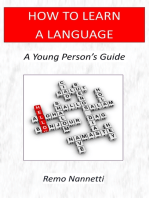Comparing & Contrasting
Comparing & Contrasting
Uploaded by
anon_602797415Copyright:
Available Formats
Comparing & Contrasting
Comparing & Contrasting
Uploaded by
anon_602797415Original Description:
Copyright
Available Formats
Share this document
Did you find this document useful?
Is this content inappropriate?
Copyright:
Available Formats
Comparing & Contrasting
Comparing & Contrasting
Uploaded by
anon_602797415Copyright:
Available Formats
COPING WITH
DIFFICULT
WORDS
TECHNIQUES IN
DEALING WITH
DIFFICULT WORDS
Pre-read before a lecture so you can anticipate some of the new words.
Use a glossary or specialist dictionary , e.g. nursing dictionary.
Use an advanced learner's dictionary. These dictionaries use the most
frequent words in English in thheir definitions so they are easier to
understand than most other dictionaries.
Make your own dictionary of new words. Put them in a sentence or given
an example.
Use your ow words for definitions.
Try to break the words up into parts.
Guess from the parts of the words , e.g. anti is against , ante is before.
Leave the word out and read the rest of the sentence to see if you can
guess its meaning from the context.
Think about your subject. How could the word relate to something you are
expected to know about?
Ask tutor / friend / native speaker to explain words.
The first step is to note the words mentally , or make a pencil mark in the
margin, and read on.Going on prevents further interruption of the
author's thought. It also gives you a chance to find out whether the rest
of passage makes the meaning clear enough for your purpose. It is more
important to go on enjoying the book than to find out how the dictonary
defines every new words.
The second step is to return to troublesome words after completing a
passage , and try to work out what each one means. Saying the word
aloud may help you to recognize it as one you have heard and then to
recall how it was used. If this fails , you can often make an intelligent
guess based what you have learned from reading the whole passage.
The third step , using the dictionary , is important for two kinds of words.
The first group consist of words which must be understood to understand
the whole passage adequately and second group consists of words you
know you have met before but still do not fully understand. If you came
across a word three times , then clearly it is a word you should master.
Is it necessary to know the exact meaning of a particular word? Often a
rought meaning is enough ( does the word have a positive or negative
meaning ?). Remember that the purpose of reading an academic text is to
get information and it is not necessary to be able to explain , or translate ,
the meaning of a word.
Look for definitions. Author may know a particular word may be new so
explains. The author may also be using the word in a new , or unusual
DEALING WITH
DIFFICULT WORDS way so will need to explain how it is being used. This will be done
You might also like
- Exam Preparation Tips For B1-B2Document10 pagesExam Preparation Tips For B1-B2Hemn Rafiq TofiqNo ratings yet
- Difficulties in Learning VocabularyDocument3 pagesDifficulties in Learning Vocabularyguccirush297% (32)
- Techniques For Dealing With Difficult WordsDocument1 pageTechniques For Dealing With Difficult Wordskak_nahNo ratings yet
- Exam Preparation Tips For C1-C2Document12 pagesExam Preparation Tips For C1-C2Vladimír Dolinec100% (2)
- Learningexpress Vocabulary and Spelling Success in 20 Minutes A Day 4th 5512Document22 pagesLearningexpress Vocabulary and Spelling Success in 20 Minutes A Day 4th 5512NguyenHung50% (2)
- Word Attack SkillsDocument1 pageWord Attack Skillsanna39100% (1)
- Develop Vocabulary While ReadingDocument3 pagesDevelop Vocabulary While ReadingJohnson Choppala100% (1)
- Improve Your VocabularyDocument62 pagesImprove Your VocabularyUshba SabihaNo ratings yet
- Handling Hard WordsDocument12 pagesHandling Hard WordsAisyah MusfirahNo ratings yet
- Topic 4 Vocabulary SkillsDocument12 pagesTopic 4 Vocabulary SkillsHiasDulang RajaSehariNo ratings yet
- Coping Up With Difficult WordsDocument16 pagesCoping Up With Difficult WordsKazuri RiveraNo ratings yet
- Learning Tips: Learning in Classroom: Make The Most of It!Document4 pagesLearning Tips: Learning in Classroom: Make The Most of It!Erika VizváryNo ratings yet
- Improve Learning Techniques PDFDocument4 pagesImprove Learning Techniques PDFamitalwarNo ratings yet
- C1 - Exam TipsDocument4 pagesC1 - Exam TipsjosemiNo ratings yet
- Spears Sample ChapterDocument30 pagesSpears Sample ChapterHuy DangNo ratings yet
- Short Stories in English For Beginners BookPart-14Document1 pageShort Stories in English For Beginners BookPart-14Mohamed RinosNo ratings yet
- British Council Is A Proud Co-Owner of IELTSDocument2 pagesBritish Council Is A Proud Co-Owner of IELTSmorgandasyaNo ratings yet
- Difficult Words Dealing TechniqueDocument2 pagesDifficult Words Dealing Techniquejudalyn mondejarNo ratings yet
- ELI 72: Reflection of Vocabulary Learning StrategiesDocument3 pagesELI 72: Reflection of Vocabulary Learning StrategiesSiddhi CopiersNo ratings yet
- Tips For Teaching The Seventh, Advanced and Profieciency ExamsDocument18 pagesTips For Teaching The Seventh, Advanced and Profieciency ExamsCarolinaNo ratings yet
- GAT General (NTS) Preparation by Murtaza Khan Khajjak - Verbal Ability PDFDocument14 pagesGAT General (NTS) Preparation by Murtaza Khan Khajjak - Verbal Ability PDFArif Ullah Khan Niazi100% (3)
- Helpful Hints - Foreign Language LearningDocument5 pagesHelpful Hints - Foreign Language Learningapi-288469731No ratings yet
- Improving Your VocabularyDocument7 pagesImproving Your VocabularyAbidah Sarajul HaqNo ratings yet
- 0 Exam TipsDocument5 pages0 Exam TipsbarreiromartinezNo ratings yet
- Guess Meaning Theory S6Document11 pagesGuess Meaning Theory S617 Ihsan ErtansaNo ratings yet
- How To Improve Reading Skill STDocument20 pagesHow To Improve Reading Skill STGül Çisem GülenlerNo ratings yet
- Presenting VocabularyDocument9 pagesPresenting VocabularyEnglish Kids SchoolNo ratings yet
- Word Recognition SkillsDocument10 pagesWord Recognition Skillssiti_jamaludin_10No ratings yet
- Prehension PassagesDocument17 pagesPrehension Passagesak4304742No ratings yet
- U07 L03 Lesson 3 Teaching VocabularyDocument18 pagesU07 L03 Lesson 3 Teaching VocabularyPrince RajNo ratings yet
- Comprehension SkillsDocument6 pagesComprehension Skillsportiaberemauro7No ratings yet
- Academic Writing ASSIGNMENT (2)Document14 pagesAcademic Writing ASSIGNMENT (2)SherazButtNo ratings yet
- Reading Techniques: The Four Main Types of Reading Techniques Are The FollowingDocument5 pagesReading Techniques: The Four Main Types of Reading Techniques Are The FollowingGayatri ManralNo ratings yet
- BC PDFDocument279 pagesBC PDFAtharvNo ratings yet
- SECTION C: Task 4: Forum QuestionsDocument5 pagesSECTION C: Task 4: Forum QuestionsMuhammad HilmiNo ratings yet
- Essential Collage English Ebook Latest EditionDocument117 pagesEssential Collage English Ebook Latest EditionRabiatul 0118No ratings yet
- How To Increase Reading ScoreDocument6 pagesHow To Increase Reading Scorefebi85No ratings yet
- Coping Up With Difficult WordsDocument16 pagesCoping Up With Difficult WordsMaYel100% (4)
- Reading Skills For ComprehensionDocument46 pagesReading Skills For Comprehensionnamma.wedding1806No ratings yet
- A 7 Step Framework For Vocabulary Study While Reading PDFDocument5 pagesA 7 Step Framework For Vocabulary Study While Reading PDFHamedHashemianNo ratings yet
- Exam Tips Flyer - v1Document2 pagesExam Tips Flyer - v1Narelle CarterNo ratings yet
- 1presenting VocabularyDocument3 pages1presenting VocabularyahmedaliiNo ratings yet
- Learning TipsDocument3 pagesLearning TipsDominic GalliardNo ratings yet
- Fifty Ways to Practice Grammar: Tips for ESL/EFL StudentsFrom EverandFifty Ways to Practice Grammar: Tips for ESL/EFL StudentsRating: 2.5 out of 5 stars2.5/5 (7)
- How To Become A Successful Language LearnerDocument9 pagesHow To Become A Successful Language LearnerNadia KniftonNo ratings yet
- Ways To Improve VocabularyDocument2 pagesWays To Improve VocabularyEden LowNo ratings yet
- Improve Your Reading Skills For 3rd B.tech CecDocument6 pagesImprove Your Reading Skills For 3rd B.tech CeckbaluenglishNo ratings yet
- How To Increase Your VocabularyDocument15 pagesHow To Increase Your VocabularyScribdTranslationsNo ratings yet
- Reading Tips: MEESTERGIJS - NL/vaardigheden/lezenDocument21 pagesReading Tips: MEESTERGIJS - NL/vaardigheden/lezenEnzoNo ratings yet
- Tips On All ModulesDocument5 pagesTips On All Modulesrawanelahib87No ratings yet
- Wordattack 1Document1 pageWordattack 1sanjuNo ratings yet
- Topic 4aDocument46 pagesTopic 4aKritikaa De BritoNo ratings yet
- 4 Language SkillsDocument4 pages4 Language SkillsLina ComeiNo ratings yet
- 3 R Eceptive Skills: Reading: How Can You Help Your Students Improve Their Reading?Document5 pages3 R Eceptive Skills: Reading: How Can You Help Your Students Improve Their Reading?Anita MadunovicNo ratings yet
- Reading SkillsDocument6 pagesReading SkillsPhuongthao CatNo ratings yet
- Petua Belajar BiologiDocument2 pagesPetua Belajar BiologiSiti Zuraidah IsmailNo ratings yet
- Fifty Ways to Practice Vocabulary: Tips for ESL/EFL StudentsFrom EverandFifty Ways to Practice Vocabulary: Tips for ESL/EFL StudentsRating: 4 out of 5 stars4/5 (20)
- How To Write Reading And Listening ActivitiesFrom EverandHow To Write Reading And Listening ActivitiesRating: 5 out of 5 stars5/5 (2)
- Teaching Reading: Foundational Principles for the ClassroomFrom EverandTeaching Reading: Foundational Principles for the ClassroomRating: 1 out of 5 stars1/5 (1)

